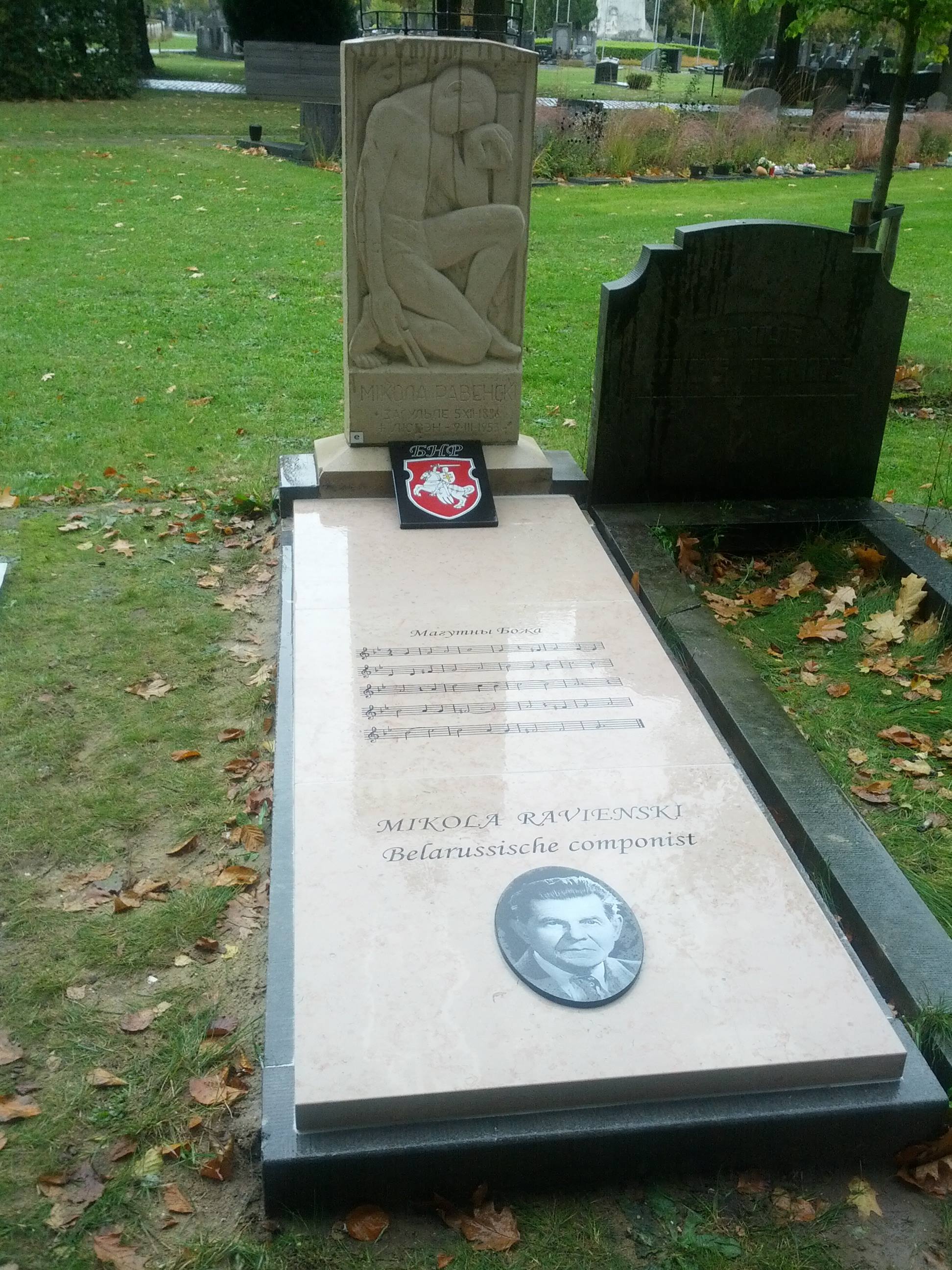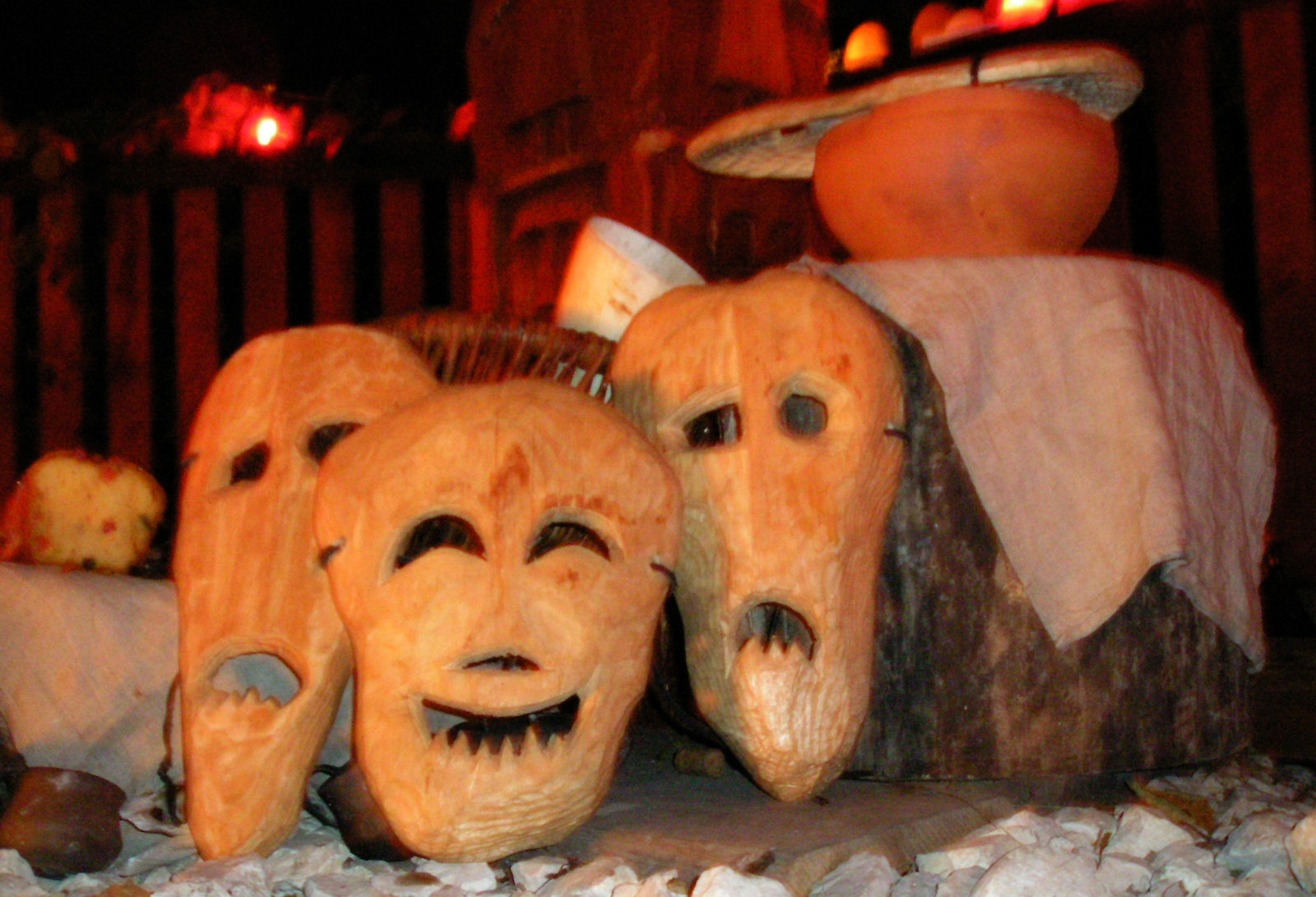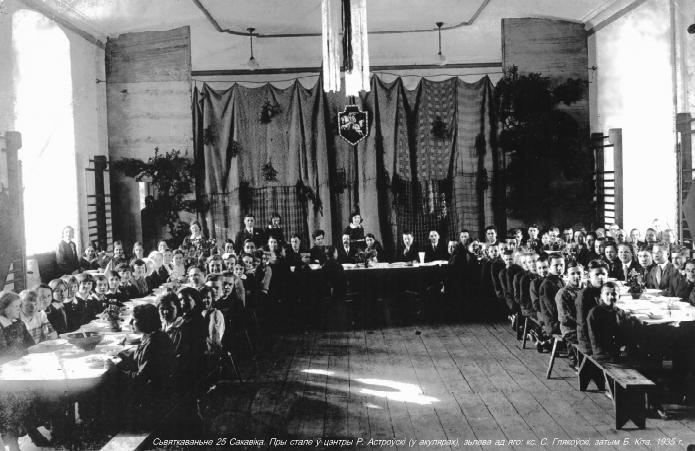|
Mikola Ravienski
Mikola Ravienski (; 5 December 1886 - 9 March 1953) was a Belarusian composer, conductor and music critic who authored music for the famous hymn Mahutny Boža (Almighty God). Early life Ravienski was born on 5 December 1886 into the family of a gardener working at the Kaplancy estate in Ihumien district, Minsk Province of the Russian Empire (nowadays the village of Kaplancy in Bierazino District, Minsk Region, Belarus). From the age of five he sang in a local church choir and was later invited to a church choir in Minsk where he received his primary musical education. In 1903 he was posted as a choir conductor to a Minsk monastery and then to Navahrudak where he collected over 500 folk songs. Later life From 1919 Ravienski worked in Minsk as a choir conductor and a school teacher. At this time his first compositions appeared - songs based on poems by Maksim Bahdanovič, Kanstancyja Bujło, an introduction to the poem "Hapon" by Vincent Dunin-Marcinkievič, the song "Oh you ... [...More Info...] [...Related Items...] OR: [Wikipedia] [Google] [Baidu] |
Mahutny Boža (Almighty God)
"Mahutny Boža" (, translated as "Almighty God") is a famous Belarusian hymn, based on a poem by Natallia Arsiennieva and music by Mikola Ravienski. It was translated into English by Vera Rich. The hymn has given its name to a festival of ecclesiastical music in Mahilioŭ and became one of the protest songs during the 2020-21 Belarusian protests. History In 1947 composer Mikola Ravienski wrote music for the poem "Prayer" written by Natallia Arsiennieva four years earlier. Soon it became widely used by Belarusian communities in the UK, US, Canada and Australia. Since the late 1980s, the hymn has gained popularity in post-Soviet Belarus. In 1993 the Catholic Church in Belarus initiated a festival of ecclesiastical music in Mahilioŭ which was named after the hymn. In 1995 the hymn was proposed as one of the candidates for the national anthem of Belarus. However, the government of Alexander Lukashenka instead adopted the old anthem of Soviet Belarus with some variation to th ... [...More Info...] [...Related Items...] OR: [Wikipedia] [Google] [Baidu] |
Belarusian State Academy Of Music
The Belarusian State Academy of Music (''Беларуская дзяржаўная акадэмія музыкі'') is the primary music and higher education institution and research center of musicology, folklore, aesthetics, music pedagogy in Belarus, based in Minsk. Minsk had earlier had a conservatory, Minsk Conservatory. It was founded in 1932 and up to 1992 was known as the Belarusian State Conservatory. In 2000 the Belarusian Academy of Music was granted status as the leading institution of the national system of education in the field of musical art, alongside the Belarusian State Academy of Arts. Rectors * M. Kazakov (1932-1933) * J. Pris (1933-1934) * Konstantin Bogushevich (1934-1936) * Oscar Gantman (1937-1938) * Mikhail Berger (1938-1941) * Nikolai Aladov (1944-1948) * Anatoly Bogatyrev (1948-1962) * Vladimir Olovnikov (1962-1982) * Igor Luchenok (1982-1985) * Mikhail Kozinets (1985-2005) * Alexander Rashchupkin (2005-2010) * Ekaterina Dulova (2010-2022) * Elena Kura ... [...More Info...] [...Related Items...] OR: [Wikipedia] [Google] [Baidu] |
1886 Births
Events January–March * January 1 – Upper Burma is formally annexed to British Burma, following its conquest in the Third Anglo-Burmese War of November 1885. * January 5– 9 – Robert Louis Stevenson's novella ''Strange Case of Dr Jekyll and Mr Hyde'' is published in New York and London. * January 16 – A resolution is passed in the German Parliament to condemn the Prussian deportations, the politically motivated mass expulsion of ethnic Poles and Jews from Prussia, initiated by Otto von Bismarck. * January 18 – Modern field hockey is born with the formation of The Hockey Association in England. * January 29 – Karl Benz patents the first successful gasoline-driven automobile, the Benz Patent-Motorwagen (built in 1885). * February 6– 9 – Seattle riot of 1886: Anti-Chinese sentiments result in riots in Seattle, Washington. * February 8 – The West End Riots following a popular meeting in Trafalgar Square, London. * F ... [...More Info...] [...Related Items...] OR: [Wikipedia] [Google] [Baidu] |
Natallia Arsiennieva
Natallia Arsiennieva (also spelled as Arsenneva or Arsieńjeva; Belarusian language, Belarusian: Наталля Аляксееўна Арсеньева; ; 1903–1997) was a Belarusian playwright, poet and translator who authored the lyrics to the hymn "Mahutny Boža (Almighty God), Mahutny Boža” (Almighty God). She was married to Francišak Kušal. Origin and early life Arsiennieva was born on 20 September 1903 into a middle class family in Baku, a major oil-producing centre of the Russian Empire (today the capital of Azerbaijan). In 1905 Arsiennieva's family moved first to Volhynia (Volyn) and then to Vilnius, Wilno (Vilnius) where she spent her childhood and graduated from the Belarusian Gymnasium of Vilnia, Belarusian gymnasium of Wilno in 1921. She later studied at the Arts Department of the Vilnius University, University of Wilno.Арсеннева (Кушаль) Наталля // Маракоў Л.У. Рэпрэсаваныя літаратары, навукоўцы, ... [...More Info...] [...Related Items...] OR: [Wikipedia] [Google] [Baidu] |
Źmitrok Biadula
Samuil Jafimavič Płaŭnik ( be, Самуіл Яфімавіч Плаўнік, translit=Samuil Jafimavič Płaŭnik; yi, שמואל בן חיים פּלאַווניק; 23 April 1886 – 3 November 1941), better known by the pen name Źmitrok Biadula ( be, Зьмітрок Бядуля), was a Soviet and Belarusian poet, prose writer, translator, and political activist in the Belarusian independence movement. He is considered one of the fathers of modern Belarusian literature. Biography Zmitrok Biadula (Samuil Jafimavič Płaŭnik) was born on 23 April 1886 in the small town of (now in Lahoysk District, Minsk Region) to a Jewish family. He began writing Hebrew poems at age 13, based on medieval liturgical poetry. He later started writing in Russian and Belarusian, publishing works in the Saint Petersburg press and the Vilnius magazine ''Mołodyje Porywy''. In 1910 he published poetic prose in ''Nasha Niva''. Following the Soviet takeover of Belarus, he began writing novels i ... [...More Info...] [...Related Items...] OR: [Wikipedia] [Google] [Baidu] |
Yakub Kolas
Yakub Kolas (also Jakub Kołas, be, Яку́б Ко́лас, – August 13, 1956), real name Kanstantsin Mikhailovich Mitskievich (Канстанці́н Міха́йлавіч Міцке́віч, ) was a Belarusian writer, dramatist, poet and translator. People's Poet of the Byelorussian SSR (1926), member (1928) and vice-president (from 1929) of the Belarusian Academy of Sciences. In his works, Yakub Kolas was known for his sympathy towards the ordinary Belarusian peasantry. This was evident in his pen name 'Kolas', meaning 'ear of grain' in Belarusian. He wrote collections of poems ''Songs of Captivity'' (russian: Песни неволи, 1908) and ''Songs of Grief'' ( be, Песьні-жальбы, 1910), poems ''A New Land'' ( be, Новая зямля, 1923) and ''Simon the Musician'' ( be, Сымон-музыка, 1925), stories, and plays. His poem ''The Fisherman's Hut'' ( be, Рыбакова хата, 1947) is about the fight after unification of Belarus with the ... [...More Info...] [...Related Items...] OR: [Wikipedia] [Google] [Baidu] |
Pahonia (anthem)
Pahonia ( be, Пагоня – ''Pursuit'') is a Belarusian patriotic song based on the eponymous poem by Maksim Bahdanovič. Background The poem ''Pahonia'' by Maksim Bahdanovič was written in 1916 in Minsk. It was later translated into English by Vera Rich. During the interwar period, the youth of Western Belarus (at the time part of the Second Polish Republic) sang this poem to the tune of the French La Marseillaise, Marseillaise. The music was written by Belarusian composer and immigrant activist Mikalay Shchahlou-Kulikovich, who in the 1950s and 1960s released five musical albums in the United States which included his own compositions, covers of ethnic Belarusian songs, and songs to the works of various Belarusian poets. The song was originally meant to be sung a capella. Mikola Ravienski, and Vladimir Mulyavin also made covers of this song as well as other Belarusian musicians and bands. In the early 1990s, Shchahlou-Kulikovich’s version was considered as one of th ... [...More Info...] [...Related Items...] OR: [Wikipedia] [Google] [Baidu] |
Dziady
Dziady ( Belarusian: , Russian: , Ukrainian: , pl, Dziady; lit. "grandfathers, eldfathers", sometimes translated as Forefathers' Eve) is a term in Slavic folklore for the spirits of the ancestors and a collection of pre-Christian rites, rituals and customs that were dedicated to them. The essence of these rituals was the "communion of the living with the dead", namely, the establishment of relationships with the souls of the ancestors, periodically returning to their headquarters from the times of their lives. The aim of the ritual activities was to win the favor of the deceased, who were considered to be caretakers in the sphere of fertility. The name "dziady" was used in particular dialects mainly in Poland, Belarus, Polesia, Russia and Ukraine (sometimes also in border areas, e.g. Podlachia, Smoleńsk Oblast, Aukštaitija), but under different other names (''pomynky'', ''przewody'', ''radonitsa'', ''zaduszki'') there were very similar ritual practices, common among Slavs and ... [...More Info...] [...Related Items...] OR: [Wikipedia] [Google] [Baidu] |
Radio Free Europe/Radio Liberty
Radio Free Europe/Radio Liberty (RFE/RL) is a United States government funded organization that broadcasts and reports news, information, and analysis to countries in Eastern Europe, Central Asia, Caucasus, and the Middle East where it says that "the free flow of information is either banned by government authorities or not fully developed". RFE/RL is a private, non-profit 501(c)(3) corporation supervised by the U.S. Agency for Global Media, an independent government agency overseeing all U.S. federal government international broadcasting services. Daisy Sindelar is the vice president and editor-in-chief of RFE. RFE/RL broadcasts in 27 languages to 23 countries. The organization has been headquartered in Prague, Czech Republic, since 1995, and has 21 local bureaus with over 500 core staff and 1,300 stringers and freelancers in countries throughout their broadcast region. In addition, it has 700 employees at its headquarters and corporate office in Washington, D.C. Radio Free E ... [...More Info...] [...Related Items...] OR: [Wikipedia] [Google] [Baidu] |
Uładzimir Arłou
Uładzimir Arłou, known as U. A. Arlou ( be, Уладзімір Аляксеевіч Арлоў, russian: Владимир Алексеевич Орлов, Vladimir Aljakseevich Orlov; born 25 August 1953 in Polotsk, Byelorussian SSR, Soviet Union) is a Belarusian historian, writer, politician, and poet. He is chairman of the Belarusian PEN International. Biography Uladzimier Arloŭ was born into a family of intelligentsia. His mother was a teacher of history and his father held the position of a public prosecutor. In 1975 he graduated from the School of History of the Belarusian State University Belarusian State University (BSU) ( be, links=no, Белару́скі дзяржа́ўны ўніверсітэ́т, ; russian: links=no, Белору́сский госуда́рственный университе́т) is a university in Min ... (BSU) and went on to work in Novopolotsk as a teacher of history (1975—1976), and then as a reporter, head of a department, ... [...More Info...] [...Related Items...] OR: [Wikipedia] [Google] [Baidu] |
On Ravienski's Grave
On, on, or ON may refer to: Arts and entertainment Music * On (band), a solo project of Ken Andrews * ''On'' (EP), a 1993 EP by Aphex Twin * ''On'' (Echobelly album), 1995 * ''On'' (Gary Glitter album), 2001 * ''On'' (Imperial Teen album), 2002 * ''On'' (Elisa album), 2006 * ''On'' (Jean album), 2006 * ''On'' (Boom Boom Satellites album), 2006 * ''On'' (Tau album), 2017 * "On" (song), a 2020 song by BTS * "On", a song by Bloc Party from the 2006 album ''A Weekend in the City'' Other media * ''Ön'', a 1966 Swedish film * On (Japanese prosody), the counting of sound units in Japanese poetry * ''On'' (novel), by Adam Roberts * ONdigital, a failed British digital television service, later called ITV Digital * Overmyer Network, a former US television network Places * On (Ancient Egypt), a Hebrew form of the ancient Egyptian name of Heliopolis * On, Wallonia, a district of the municipality of Marche-en-Famenne * Ahn, Luxembourg, known in Luxembourgish as ''On'' * Ontario ... [...More Info...] [...Related Items...] OR: [Wikipedia] [Google] [Baidu] |
Rada Of The Belarusian Democratic Republic
The Rada of the Belarusian Democratic Republic ( be, Рада Беларускай Народнай Рэспублікі, Рада БНР, Rada BNR) was the governing body of the Belarusian Democratic Republic. Since 1919, the Rada BNR has been in exile where it has preserved its existence among the Belarusian diaspora as an advocacy group promoting support to Belarusian independence and democracy in Belarus among Western policymakers. As of 2022, the Rada BNR is the oldest existing government in exile. Formation The Rada BNR was founded as the executive body of the First All-Belarusian Congress, held in Minsk in December 1917 with over 1800 participants from different regions of Belarus including representatives of Belarusian national organisations, regional zemstvo, zemstva, main Christian denominations and Belarusian Jewish political parties. The work of the Congress was violently interrupted by the Bolsheviks. After retreat of the Bolsheviks from Minsk, the Rada (counci ... [...More Info...] [...Related Items...] OR: [Wikipedia] [Google] [Baidu] |







